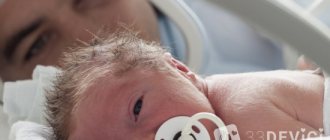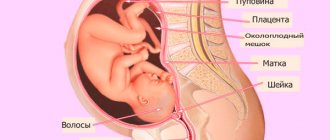What is the prognosis for premature babies born before 28 weeks?
Less than 1% of children are born this early, but they are the ones who most often experience complications.
In most cases, these babies are very low weight (less than 1 kg). They almost always require therapy using oxygen, surfactants, and mechanical ventilation to help them breathe.
These babies cannot yet suck, swallow and breathe at the same time, so they must be fed intravenously until they develop the necessary skills.
In addition, such babies cannot cry yet (or you cannot hear them because of the tube in the throat). They sleep almost all day. They have weak muscle tone and move very little. Babies born at this stage look completely different from full-term babies. They have wrinkled skin that is purple-red in color.
Premature babies: statistics
Today, premature births are common. In most developed countries, this figure is relatively stable and amounts to 5-10% of the total number of newborns.
If we talk about progress in the field of survival of premature babies, medicine has made significant strides forward. In the 50s of the last century, three quarters of babies weighing less than 1300 grams died as newborns. Half of the survivors grew up mentally retarded or had developmental disabilities. By age 80, 80% of babies weighing less than 1,500 grams at birth survived. Less than 15% of them subsequently suffered from growth and development disorders. Today, 90% of premature babies grow up without complications.
You should know that in our time doctors state the following causes and risks of prematurity: short intervals between pregnancies, the age of the woman giving birth is under 20 years, miscarriages or stillborn children in previous pregnancies, multiple abortions, multiple pregnancies.
Premature babies: 28-30 weeks
The term of a premature baby is 28-30 weeks of pregnancy - this is an average degree of prematurity. Of course, compared to being born before 28 weeks, such a newborn has a more significant chance of survival.
But in such babies, the lungs are not fully mature for independent breathing. In most cases, they need help in the form of ventilation or the supply of a stable flow of air that is enriched with oxygen. Most children born with moderate prematurity require such medical and respiratory assistance for a short period.
When a child is on a ventilator, he is fed through an intravenous catheter. If the baby breathes on his own, then he is fed breast milk through a tube until he learns to suck on his own.
With proper care and medical supervision, babies born at 28-30 weeks will successfully survive and develop. Modern medicine today is able to save the lives of babies whose weight is less than a kilogram. Such babies are placed in specialized departments, incubators, and discharged only when their body weight reaches 2000-2300 grams and the threat to life and health disappears.
Childbirth at 28 weeks of pregnancy and its consequences for mother and child
It is so thin that all the vessels are visible. The body and face are covered with soft hairs called lanugo. These babies have not had time to gain fat tissue, so they are very thin. The eyes are usually permanently closed and have no eyelashes.
These babies are at high risk of medical complications. They have to stay in the intensive care unit for quite a long time. Unfortunately, approximately 25% of these premature babies experience some form of serious developmental disorder. In about half of the cases, children later experience minor impairments, such as difficulties in learning and behavior.
Premature babies: after cesarean
In premature infants, the unpreparedness of the respiratory system for independent breathing may manifest as respiratory distress syndrome. A child’s lungs simply cannot cope with providing the body with the required amount of oxygen. This manifests itself in shallow and irregular breathing, which is fraught with the development of respiratory diseases.
A caesarean section does not always go smoothly. The reason is those health changes that became indications for surgery. During a caesarean section, the newborn may be injured when removed from the uterus. And trauma is possible damage to the nervous system with disruptions in motor activity and muscle tone, which can result in the development of paresis and paralysis. Similar consequences arise as a result of the hypoxia that the infant experiences during surgery. That is why such a child can sit up and crawl, walk and talk later than his peers. In adolescence, premature babies born by cesarean section are more often susceptible to vegetative-vascular dystonia and sensitivity to weather changes, headaches and fainting. But there is no need to be alarmed prematurely. Sometimes a caesarean section is the only way to save a premature baby, so the risks are always justified.
Premature babies: development
A healthy premature baby develops rapidly.
He seems to be catching up with his peers. Babies born weighing 1500-2000 grams double their body weight by three months. And per year their weight increases 4-6 times. Similar healthy changes occur with growth. So, during the first year, height increases by 27-38 centimeters, during the second year - by 2-3 cm every month. When such a baby turns one year old, his height usually reaches 77 cm.
As for the development of psychomotor skills, at birth up to 2 kg it lags behind compared to full-term babies. In the first or second month of their life, premature babies sleep a lot, move little, and get tired quickly. After 2 months, their activity increases, as does the tension of the limbs. Their fingers are constantly clenched into a fist and are difficult to straighten, and their thumb is almost not retracted. To correct the problem, you should work with such a child and do exercises. A premature baby has an immature nervous system. He may often get scared and flinch at sudden sounds and even for no reason. The main feature of premature babies is decreased immunity, which means low resistance to any disease. Such children have a predisposition to gastrointestinal diseases and otitis media, respiratory infections and viral diseases.
Communication with premature babies is an important component of their development.
Doctors limit communication and generally visiting such a child in the first days after birth, because he needs rest. But the mother has the right to be nearby and watch her child through the glass wall. After some time, when the condition is stable, doctors allow the mother to take her child in her arms, because this contact is very important. This is how the pre-interrupted intrauterine development of the child continues. You need to talk to him, stroke him, sing songs, talk about how much you love him. This is the basis for the development of such a baby. Emotional contact between baby and mother accelerates the child’s physical and mental development. And even if the child does not react to such actions, this does not mean that everything is useless. He is simply too weak to react. You can notice the fruits of your efforts after a month of constant communication and emotional contact with your child.
The development of premature babies is accelerated by quiet, quiet music, bright toys in the crib, and special exercises.
Perm doctors delivered a child who weighed 600 grams
5'th of July. PRAVMIR. From the Perm Regional Perinatal Center, doctors discharged a mother and her daughter, who was born at 23 weeks with a body weight of 600 grams.
The girl’s weight at discharge was more than two kilograms - 2470 grams, reports the Perm regional server. The child’s life was saved thanks to the work of obstetricians and gynecologists at the Ocher hospital and doctors from Perm.
Doctors promptly sent the pregnant woman to the regional perinatal center, and there specialists used the entire arsenal of techniques and equipment to deliver the child and then deliver the child in the neonatal pathology department. Everything necessary was done, starting from the period of preparation for labor and delivery, and then at the stages of resuscitation and nursing the child in the neonatal pathology department.
The survival rate of babies born at 23–24 weeks gestation ranges from 0 to 30%, the report said. This is due to the immaturity of all organs and systems, primarily the lungs. Alveoli are formed at the 24th week of intrauterine development, and their formation continues until 2 years of age. As the gestational age increases, the survival rate of children increases: at 27–28 weeks, more than 80% of babies survive.
The regional Ministry of Health reported that in 2020, Perm doctors saved 100 children with extremely low weight who would not have survived without special conditions. The survival rate of babies with extremely low body weight (up to 1000 grams) has improved from 65 to 80%.
In 2020, Perm doctors saved 100 extremely low-weight children who would not have survived without special nursing conditions and high-tech equipment. The survival rate of babies with extremely low body weight (up to 1000 grams) increased from 65 to 80%.
The threshold for fetal survival is considered to be the 22nd week, from the beginning of which the chance of survival increases by 3–4% with each subsequent day, and by 2–3% with each day after the 24th week. After 26 weeks, fetal viability with medical care is considered high. In Russian legislation, a live birth is considered the moment of separation of the fetus from the mother’s body through childbirth at a gestational age of 22 weeks or more, when the body weight of the newborn is 500 grams or more (or less than 500 grams in case of multiple births) or if the child’s body weight at birth is unknown, when the body length of the newborn is 25 cm or more if the newborn has signs of a live birth (breathing, heartbeat, pulsation of the umbilical cord or voluntary muscle movements, regardless of whether the umbilical cord is cut and whether the placenta has separated).
www.pravmir.ru
Premature babies: consequences
Nature intends for a mother to carry a child for 40 weeks. And it is clear that babies born prematurely have many more developmental problems. The shorter the period of gestation before birth, the greater the risk of developing diseases characteristic of premature babies. So, let's learn about the possible consequences of prematurity:
- Underdeveloped lungs. They pose the greatest danger. To inhale, the baby needs to make great efforts. Such children require artificial breathing support. Their respiratory center is not fully formed in their brain. Therefore, respiratory arrest (apnea) can often occur.
- Features of the heart. The fetal heart in the womb pushes blood not into the pulmonary artery, but into the aorta through the ductus arteriosus. After the baby is born full-term, this duct becomes overgrown, and in premature babies it can remain open, which can lead to increased stress on the lungs and heart. This condition requires drug treatment.
- Infections, metabolism, blindness. Infections plague premature babies much more often, because this is facilitated by the immaturity of the immune system. Viral infections are especially dangerous for such children. Premature babies often have metabolic problems and a lack of hemoglobin. In addition, this category of babies is susceptible to the development of retinal lesions, that is, retinopathy of prematurity. If it is not treated at an early age, it can lead to blindness.
Based on the above, premature babies should remain under the systematic supervision of neonatologists from the moment of birth until the period when their health is not in danger and their body is ready for independent life.
Especially for – Diana Rudenko
Such children can give their parents a lot. These children are under the protection of the Sun. They are strong and active, quickly understand and assimilate everything. They are very inquisitive and have an inquisitive mind. They have a different way of thinking than other children their age. They have a strong desire to try everything and do not want anyone to hold them back.
Those born in these numbers worry more about doubts about the authority of a parent or teacher than about the need to obey rules. Many adults feel stumped by the clever questions posed to them by children born on the 1st, 10th, 19th and 28th of any month. They are always aware of their inner strength and enjoy standing out from the crowd.
They often make others wonder and laugh. However, they need to be weaned from outright selfishness, especially for children born on the 19th and 28th of any month. Such children need attentive and caring treatment. The task of parents is to help them discover their sense of self-worth. It is very important that their parents encourage their outlook on life. The willpower of such children is their positive quality. It is important for them that adults and teachers provide them with new, challenging tasks and opportunities for exploration. These kids need to be listened to. It is important for them to have space to try out their ideas. At the same time, they need an audience that is ready to accept their unexpected observations.
The biggest challenge for children born on the 1st, 10th, 19th and 28th of any month is learning to live in society and understanding that they are not always right. To help them develop their own unique personality and avoid being indifferent to others, it is best to allow them to behave like adults. This is a trust that these children will thank you for. They sometimes show so much self-confidence that adults simply do not pay attention to their need for support. Parents need to be attentive to such children, with tenderness and patience to overcome their attempts to isolate themselves and even withdraw into themselves.
These children are often very happy in moments of solitude. They just need to communicate with people who have intuition. Such children can give their parents a lot. They will have to learn to be patient with their parents, and parents of such children should not be afraid to offer their kids different options for using their free time. If the mother or father of such a child are strong personalities, then there is a chance that he will respect his parents and will go towards them. Everyone will benefit from this and be happy.
Childbirth at 22-27 weeks of pregnancy is not common, but is difficult and unsafe. With a favorable set of circumstances and competent, adequate behavior of a woman, unpleasant consequences can be avoided.
The problem of premature birth is very relevant. According to statistics, 5-12% of all children are born prematurely.
What births are considered premature
What week is birth considered early? A pregnancy is considered premature if it is interrupted between the 22nd and 37th weeks.
According to the WHO classification, childbirth before the 28th week (including birth at the 25th week of pregnancy) with the birth of a child weighing from 0.5 to 1 kg is very early premature birth.
In Russia, premature birth is considered to be termination of pregnancy at 28-37 weeks with a fetal weight of 1 to 2.5 kg. Childbirth at 26 weeks and birth at 27 weeks are considered if the child lived more than 7 days after birth.
If there was a birth before the 28th week (including at the 22nd week of pregnancy, a birth at the 27th week, or a birth at the 26th week (or earlier)), and the baby died within the first 7 days, then this is considered a late miscarriage.
Causes of premature birth
All the reasons why pregnancy is terminated in the early stages (including premature birth at 24 weeks) are usually divided into several main groups. These can be both negative factors and factors that are initially positive (violent sex, a woman’s activity at some holiday, etc.), which can negatively affect the course of pregnancy.
Reasons related to women's health
Endocrine factors
These are disturbances in the functioning of the corresponding internal organs and systems in a woman’s body - the ovaries, adrenal glands, pituitary gland, thyroid gland. These factors often lead to premature birth at 25 weeks and other early stages.
Infectious factors
First of all, this refers to infections in the female genital organs:
- diseases of the uterus and appendages;
- cervix;
- bacterial vaginosis.
In some cases, a chronic infection that does not manifest itself may have an effect. An infectious lesion of a woman’s body can lead to intrauterine infection of the membranes, amniotic fluid, and then the fetus itself. This can also trigger labor at 21 weeks.
Uterine factors
This group includes anatomical changes in the genital organs:
- underdeveloped uterus (infantilism);
- malformations of the uterus – “one-horned”, “two-horned” uterus;
- uterine tumors;
- scars and other damage resulting from previous births or abortions;
- isthmic-cervical insufficiency (ICI).
Causes related to fetal development
This includes two large groups of factors:
- defects and anomalies of fetal development;
- genetic diseases.
Combined factors (individual characteristics of pregnancy)
At present, effective medical technologies have not yet been developed for diagnosing miscarriage of an immune nature (with the exception of a discrepancy between the Rh factor of the blood of the mother and the fetus). Therefore, immunological factors may pose a big problem. Disturbances in the “mother-placenta-fetus” chain lead to the woman’s body perceiving the fetus as a foreign transplant and rejecting it.
This group also includes some pregnancy complications - preeclampsia, placenta previa, premature placental abruption, abnormal fetal position, breech presentation, polyhydramnios, multiple fetuses, premature rupture of water.
Social, household and biological factors
Poor nutrition, physical activity, poor living conditions, stress, bad habits - all this also often causes childbirth.
Experts also draw attention to the fact that women under the age of 20, unmarried women, women with an unwanted pregnancy, and women who already have several children are more at risk of premature birth. Childbirth at 23 weeks of pregnancy and other early stages is rare for women who do not fit this description.
Signs of early labor
Signs can be obvious or hidden. You need to know them well in order to see a doctor in time.
Question of Life. 600 grams of difficult happiness
November 21, 2018
26 babies with extremely low body weight were born in the perinatal center of Rostov
Donnews.ru, together with the Ministry of Health of the Rostov Region, continues the “Question of Life” project. In a series of publications, we will try to find answers to the most pressing questions related to the provision of medical care, we will talk about the people who guard our health, as well as about the prospects and innovations of the industry.
Neonatologist Natella Zemlyanskaya, deputy chief physician for pediatric care at the Rostov Regional Perinatal Center, talks about how children with extremely low body weight are saved and how to “survive” in a profession where life goes hand in hand with death.
Happy 54%
The neonatal intensive care unit is quiet. On the monitors that measure the vital signs of premature babies, numbers glow, each of which plays a decisive role: live or die. With confident movements, doctors and nurses perform the necessary procedures. Given the size of the patients, installing an intravenous catheter is almost a piece of jewelry.
In one incubator there are two babies weighing just over a kilogram - brother and sister, the so-called “royal twins”. They were born a few hours ago, their weight is small, but the prognosis is quite favorable. In the other two incubators - brothers, whose weight is larger and whose condition also does not cause concern - one of the twins has already even begun to receive breast milk.
Kuvez is a special box for nursing very tiny babies.
It’s not so calm in the next room - today, at 24 weeks of pregnancy, a baby weighing 450 grams was born... No one here makes predictions, repeating to themselves, like a mantra: “Do what you have to, and come what may.”
Since the beginning of the year, the perinatal center has attended 2,700 births, resulting in the birth of almost 3,000 children. Among them are 6 triplets, 214 twins. According to Natella Zemlyanskaya, 26 of the babies born had extremely low body weight - up to a thousand grams. The survival rate among such babies is 54%. This figure is quite consistent with the average Russian level, but there is something to strive for: in the leading centers of the country, for example in St. Petersburg, about 70% of such babies survive.
A baby born after 37 weeks of pregnancy is considered full-term. Premature babies are divided into three groups by weight: extremely low body weight - from 500 to 1000 grams, very low body weight - from 1000 to 1500 grams, low body weight - from 1500 to 2500 grams.
The smallest baby that doctors at the Rostov Perinatal Center managed to save this year was born weighing only 600 grams. He was one of twins; unfortunately, the second child could not be saved.
Also, over 10 months of this year, 112 children weighing from 1000 to 1500 grams were born. In such cases, the chance of survival is, of course, much higher.
“The indicators are very optimistic, but we are always dissatisfied with them,” notes Natella Zemlyanskaya. “When children die, doctors cannot escape the feeling of powerlessness. We are forced to inform the mother that we did everything possible, but we could not save her child. It's very hard. The routing system in the Rostov region is designed in such a way that the most severe cases from the entire Rostov region are concentrated in the perinatal center. It was created so that all women who had problems in previous pregnancies, had losses or premature births, were delivered here in a timely manner. Here we observe, treat and try to maintain pregnancy as long as possible so that children are born more viable.
Reference
The routing system was introduced in 2012 after the healthcare modernization program was implemented and all hospitals received the necessary equipment. By order of the Ministry of Health of the Rostov Region, all medical institutions providing care to pregnant women were divided into three levels according to the degree of complexity of the patients. At the first level there are 27 district hospitals, at the second level there are 17 inter-district centers, and at the third level there are 4 institutions of the highest profile, such as a perinatal center. Since 2020, the system has been debugged and is in full force. The question of where a woman will give birth is decided from the moment she registers for pregnancy. If no complications are identified during the studies and mandatory screenings, the woman remains to give birth at her place of residence. If there are risks, the woman in labor is sent to second or third level institutions. All this is written down in the pregnant woman’s exchange card.
According to Natella Zemlyanskaya, today it is generally accepted in the world that due to urbanization and environmental problems, the percentage of premature babies should increase in the future. But statistics in the Rostov region show that in the region this is a fairly stable figure - 5-6%. But there are more and more multiple pregnancies in the center, again, this is what the routing system is aimed at.
— All women with multiple pregnancies are at risk. Nature has decreed that a woman should bear only one child. More than one fetus is already an emergency situation, because everything that one child should have received must be divided between two, or even three. Almost always these children are born prematurely. And if with twins it is sometimes possible to extend the pregnancy to 37 weeks, with triplets - never.
Twins and triplets are not always the result of IVF. Natella Zemlyanskaya notes that today there is a boom in natural multiple pregnancies. As for assisted reproductive technologies, the International Association of Reproductive Physicians decided to be guided by the principle - one transfer - one embryo. This increases the chances of the long-awaited baby being born healthy and on time.
Meanwhile, there are many reasons for prematurity, in addition to multiple pregnancies.
— In short, this may be due to problems in the mother’s body, and not related to the reproductive sphere. For example, with hormonal disorders. The process of gestation places the not entirely healthy body of a pregnant woman in extreme conditions, and premature birth occurs. There are problems with the genitourinary system - these are both inflammatory and infectious diseases. Sometimes the cause of premature birth is related to the condition of the fetus. It may sound a little cynical, but it happens that if the fetus is not entirely healthy, the body rejects it. For example, with chromosomal or genetic disorders.
Few people want to watch children die
Nursing one premature baby lasts from 1 to 5 months. On average, about 800 thousand rubles are spent on medicines for one baby alone. At the same time, even some doctors express the opinion that nursing babies with extremely low body weight is unpromising. Among the arguments are a high risk of disability, huge costs of rehabilitation, and the difficult life of the parents of such a child. Natella Zemlyanskaya does not share this opinion.
— From my first day of work, and this has been more than 30 years, I have been caring for premature babies. I am sure that you cannot do something and consider that it is unpromising. During my life, I have seen a lot of children, including those with a birth weight of up to 1000 grams, who had a lot of problems, but they managed to survive and grew up healthy. Our motto is - do what you have to, and whatever happens, it’s not up to us to decide. Everything is decided on a completely different level, by God. Yes, a certain percentage of these children die. There are children who have disabilities, but there are not so many of them, and every year, thanks to new technologies and the development of science, disability can increasingly be avoided. There are also children who had health problems for the first 5 years of life, but thanks to the efforts of parents and doctors, they become absolutely normal children in terms of health. Not everything is in our hands, but a lot is in our hands. It is imperative to save and help these women and these children.
According to Natella Zemlyanskaya, the profession of a neonatologist is very rewarding, because it will allow you to help those who simply cannot survive without the help of doctors.
“When a child manages to come out, we see the happiness of his parents and family. It gives a feeling of being needed. Not all parents come to say words of gratitude, but I know for sure: on every birthday of their child, they remember what they had to endure. And somewhere they probably have a thought: how good it is that there are such people in the world, not just one person, but a whole team of nurses and doctors who saved my child.
At the same time, not everyone can work as a neonatologist. Many future doctors, when choosing a specialization, are simply afraid to go into this field.
— We are experiencing a shortage of specialists. Neonatology is a very difficult specialty. Previously, when I started, the profession was closer to pediatrics, but now very complex technologies, equipment, and modern methods are used. Such children are cared for by doctors who have two specialties - neonatology and resuscitation. It's hard, you need to study for a long time. Not everyone copes. Not only does it require a lot of knowledge and skills, but the emotional load is also very high: people are dying, and not just people, but small children! Many people say: “Oh, no, no, I can’t see these children suffering.” It’s easy to be kind and not want to see it or hear it. But the salvation for those who nevertheless chose this work is joy at the moment the rescued child is discharged.
In the area of special attention
In Russia, in recent years, a whole network of perinatal centers has been created. Their work is under constant scrutiny, and often medical institutions find themselves at the center of conflict situations.
“We often see such unpleasant situations arise in one center or another. I understand why this happens. Firstly, the state has invested a lot of money in these centers and, of course, it expects a return. But the return does not happen immediately, because building walls and purchasing equipment is not everything. There must be personnel who can use all this effectively. There are not enough personnel. In addition, there is a huge emotional burden, because the performance of perinatal centers is monitored at the highest level throughout the country. The most unfavorable cases are initially brought here, and it turns out that deaths are concentrated in one place. I have repeatedly read about different ones. But as a professional, I know that you cannot generalize, you need to understand each child separately. It is possible that at this moment a contingent of children weighing 500-700 grams, whose survival rate is low, was picked up in the center. Such babies are nursed, but not all! And when a child is born weighing over 1000 grams, parents, knowing that they are caring for 600-gram ones, think: our child is twice as big, which means there must be a 100% positive result, but this is not always the case. Against this background, claims arise.
Another problem is negative information in the media and word of mouth. And the point here is not even that the image of the medical institution suffers, the problem is much deeper.
— Happy occasions, as a rule, remain among family and friends, but scandals are always heard. Some women, having read on the Internet that “everything is bad here, the equipment is broken, they don’t wash their hands, there aren’t enough medications,” cross the threshold of the perinatal center already in negativity, in aggression, against those people who are currently saving her child. The doctors will still do their job, but the baby will suffer emotionally. We always tell such mothers: you are our helper, you not only give milk, you give faith, love and energetically support your child. These are not simple words. Over more than 30 years of work, I have seen such miracles more than once, and they were recorded by equipment: the child has poor indicators, but the mother comes and the condition begins to stabilize. Those who are committed to a good outcome are more likely to get it.
Just one of these situations that has thundered throughout Russia is the case in Kaliningrad, where a doctor is accused of not administering the necessary expensive drug to a child, as a result of which the baby died. It is reported that this was done so as not to spoil the statistics and present the case as if the baby died in the womb.
“We know about this case from the media. Taking into account my personal sad experience, I can say that the information is often inadequate. I need to know information from the original source. But I am more than sure that not a single doctor will stop the drug just so as not to spoil the target indicators. Never! Perhaps the situation was misinterpreted from the words of grief-stricken parents. I can't blame them, everyone reacts to loss differently. But there are people who, after a sad outcome, come and give thanks, because they saw that everything possible was done to save their child. Others just cross the threshold, and are already dissatisfied with everything.
The baby, who was born weighing 450 grams, was administered that same expensive medicine at the perinatal center in Rostov. And they will administer all the necessary drugs to try to do the impossible...
The Rostov Perinatal Center is trying to save everyone
Fortunately, there are no problems with the medications, as Natella Zemlyanskaya says. Despite the fact that some foreign drugs were banned from import into Russia this year, this did not affect the field of neonatology. All necessary foreign medicines for caring for newborns continue to be purchased.
Non-random accidents
At the beginning of her journey, when she had to decide on her specialization, Natella Zemlyanskaya made a choice, as it seemed to her, completely by accident.
“I entered this profession unconsciously. My specialty is pediatrics, and I knew that I wanted to work with children, and it didn’t matter which ones. Chance helped - I ended up in a department for premature babies. As it turned out, this was my destiny, I just didn’t know about it yet: my birthday is November 17, and after years of my work, this particular date was recognized as World Premature Infant Day. Everything coincided! When I started working, everything was completely different. But over the course of my life, technology began to develop so much, neonatology exploded like no other science. And I realized that it was a great success to get into this profession, where there are so many opportunities to develop, help people and see the results of your work.
On November 17, not knowing that it was her birthday, the parents of the children whom she once helped survive called Natella Zemlyanskaya to congratulate them on the holiday - World Premature Baby Day - and thank them for the happiness they had given them. The doctor admits that it is precisely moments like these that allow you to work and remain in this profession no matter what.
For advertising purposes:
dentalmagazine.ru is the first online magazine for dentists in Russia. Here you will find the latest news in the field of therapeutic dentistry, useful articles on anesthesiology, pharmacology, implantology and gnathology, and also read interviews with leading doctors of the country and the world.
Alina Klyuchko
Tactics for managing premature birth
Early labor begins
Early birth has several peculiarities. In such cases, the cervix opens much faster. The average duration of the labor process is usually 2-3 hours less (or even 2 times less) than that of a normal (timely) birth. Various kinds of abnormal situations during premature birth occur in at least 30% of cases.
Early labor most often occurs quickly and is characterized by excessive labor. Contractions during such childbirth are most often painful and much more frequent (5-6 times in 10 minutes). And sometimes the frequency of contractions can reach a level of 6-8 contractions in 10 minutes, which is very dangerous for the fetus. The length of time between contractions is reduced by 2 times.
Childbirth at 21-22 weeks of pregnancy
Children born at this stage have the lowest survival rates. The baby's lungs have not yet formed, the weight of the fetus is no more than 1 kg. The most common causes at this stage are ICI, infection in the amniotic sac and its damage. A child born at 22-23 weeks is practically doomed. The few babies who survive most often become disabled. Complications and consequences after childbirth at 26-27 weeks of pregnancy are less common, and those born at 27 weeks have a much better chance of survival.
Premature baby
If a baby is born at 26 weeks, he or she is more likely to survive than a baby born at 24 weeks, and less likely than a baby born at 27 weeks. But we must not forget that the nature of the birth itself, the consequences, the life and health of the child and mother depend on many factors. Therefore, you always need to know for what reason (most likely) premature birth occurred. It happens that even with very early births, born children survive safely.
My birth at 28 weeks (long story)
A child born at this stage has a high chance of survival, especially in the conditions of modern medicine.
Difficulties arise from the fact that during this period the woman is not yet ready for childbirth: her birth canal is not ready, labor will be weak, which can lead to bleeding and rupture of the cervix.
Risk of premature birth at 28 weeks
At risk are women who have previously had spontaneous abortions, miscarriages, if her uterus has an irregular anatomical shape, if ICI (isthmic-cervical insufficiency) is observed.
The presence of inflammation and infections of the reproductive system, as well as chronic diseases of organs - kidneys, urinary tract, thyroid gland, heart, and hormonal disorders can also become a problem.
Sometimes premature birth at 28-29 weeks occurs due to multiple pregnancy, which causes overstretching of the uterus. Early births often occur due to stress, strong emotions, excessive physical exertion, falls, and various mechanical injuries in the abdominal area. You should be extremely careful and try to stay in a good mood to avoid such troubles as premature birth at 6 months.
Symptoms of early premature labor
If you experience the following symptoms at 27-28 weeks, you should immediately consult a doctor. It is likely that labor can still be stopped and the pregnancy can be maintained until a more suitable time.
So, among the symptoms of premature birth:
- nagging pain in the lower abdomen and lower back;
- feeling of heaviness in the lower abdomen, pressure on the bladder and vagina;
- leakage of fluid from the genitals;
- cramping pain, stiffness of the abdomen - hard stomach;
- cessation of fetal movements.
What can be done?
If the doctor determines that there is no damage to the membranes, he will try to stop labor. You will probably have to go to the department for preservation, where you will be prescribed medications - antispasmodics, sedatives, hormones. Depending on the situation, you may be sent home or hospitalized for a while.
Of course, you will have to abstain from sexual relations, physical activity and stress until the end of pregnancy. If the cause of premature birth is ICN, you will have a special ring placed on your cervix, which will hold the fetus in the uterus.
Pregnancy complicated by pheochromocytoma is potentially fatal, since pregnancy and childbirth increase the risk of hypertensive crises. Diagnosis before pregnancy can reduce both maternal and fetal morbidity.
A 38-year-old pregnant woman presented at 21 weeks' gestation with progressive hypertension and headache. Unstable blood pressure ranged from 132/94 to 220/128 mmHg. Plasma norepinephrine levels increased to 9.00 ng/mL at 22 weeks' gestation. An MNR scan revealed a mass in the area of the left kidney and a pheochromacytoma was diagnosed. Labetalol and doxazosin were prescribed, after which the basal blood pressure figures ranged from 120/88 to 156/106 mmHg. Due to the size of the fetus and the patient's condition at 28 weeks' gestation, the woman was scheduled for cesarean section combined with resection of the pheochromacytoma. Diazepam and famotidine were used for premedication; labetalol (150 mg) and doxazosin (2 mg) were given orally 3 hours before induction of anesthesia. The bispectral index value was maintained at < 60 during surgery. After tracheal intubation, blood pressure increased to 230/120 mm Hg. Sevoflurane with sodium thiopental and phentolamine (3 mg total) were given and a constant infusion of nitroglycerin (1.0 mcg/kg/min) was maintained. After successful intubation, vecuronium was administered; Blood pressure dropped to 180/120 mmHg, and surgery began. Sevoflurane was discontinued before uterine incision. After 9 minutes the newborn was delivered. The baby required intubation and mechanical ventilation, and therefore the newborn was transferred to the intensive care unit for care according to the standards for the management of premature infants. Anesthesia was maintained after delivery with an infusion of propofol (8 mg/kg/hour) and an intravenous infusion of fentanyl 175 μg. Nitroglycerin was discontinued and prostaglandin E 1 (PGE 1) infusion was started.
After suturing the wound following a cesarean section, tumor removal began.
Prevention
Healthy pregnancy – healthy offspring
When there is a threat of childbirth, every week by which the pregnancy can be extended is vital, so medical preservation measures are carried out until the 36th week. A baby born at 24 weeks of pregnancy has a much lower chance of survival than a baby born at 27 weeks of pregnancy. If doctors manage to extend the pregnancy to 27 weeks, then this can be considered a very big victory.
What do they do during conservation?
To reduce the risk, you usually do the following:
- reduce excitability and suppress contractile activity of the uterus;
- increase fetal vital activity and maturation;
- treat pathological conditions that caused the threat.
In such cases, a woman should remain in bed, refrain from physical activity as much as possible, and completely abstain from intimacy.
In most cases, when a threat arises, a woman experiences a strong feeling of anxiety and neurasthenia. To improve her condition, doctors may prescribe psychotherapy, sedatives and antispasmodics.
Fetal condition
Premature birth at 24 weeks in Russia is considered a miscarriage if the baby died within the first 7 days. Therefore, it is very important to do everything to ensure that the position of the fetus at the 27th week of pregnancy is not dangerous. At week 25, his weight is about 700 grams, his height is about 35 cm. This is not enough to leave the mother’s womb.
Analyzes
It is mandatory for a woman to pass all tests and undergo all examinations, because The reasons for possible premature birth may be different.
Ultrasound
An ultrasound examination is a mandatory procedure for any set of measures to maintain pregnancy.
Pregnancy 28 weeks - fetal development
At 28 weeks (7th month of pregnancy), the fetus is still very premature, but sometimes premature birth occurs at this time. And with proper prenatal preparation and proper postnatal care in a specialized department for premature babies, the child has every chance to survive and grow and develop further in the absence of serious congenital pathology. Since childbirth at this time is far from uncommon, the development of the fetus at this time is well known.
28th week of pregnancy and fetal size
The height of a child born at this time is 33-38 cm, the weight of the fetus fluctuates at 28 weeks of pregnancy within the range of 1100 - 1300 g.
Ultrasound measurements at 27 - 28 weeks of pregnancy
Fetal development at this stage corresponds to the average description of the development of a child born at 28 weeks. Basic dimensions that help determine the gestational age:
- BPR (biparietal skull size) 69.2 - 71.9 mm;
- FTP (fronto-parietal skull size) 88 - 91mm;
- DB (thigh length) 50.9 – 52.9 mm;
- SDHC (average chest diameter) 62.9 – 66.7 mm;
- ADD (average abdominal diameter) 71.3 – 75.4 mm;
- thickness of the placenta is 30.6 – 31.3 mm.
Woman's condition
The general condition of a pregnant woman, if something is wrong in her body, a number of signs may indicate the possible approach of early labor.
Nutrition
During pregnancy, the uterus increases in size, causing compression of other internal organs. A woman may experience shortness of breath, as well as problems with the gastrointestinal tract - constipation, heartburn. In such cases, it is recommended to review the diet, switch to lighter foods, give up spicy, fatty, sweet foods, and increase the consumption of kefir, beets and prunes.
Feel
The belly gradually becomes more round and large. Because of this, gait, posture, and general well-being change. If the doctor has not prohibited physical activity, then it must be continued until childbirth. To make the sensation less unpleasant, it is recommended to wear a bandage.
Uterus
If the uterus is in good shape, this may indicate that labor may be approaching. In such cases, you should immediately consult a doctor.
Pain
In addition to abdominal pain, pain appears in the lower back and sacral spine. You may also experience pain in your legs.
You can get rid of pain completely or partially if you follow several recommendations:
- do not sit cross-legged, do not sit on a chair without a back;
- do not sit on a hard surface for a long time;
- try to get out of bed and lie down correctly, sit down correctly;
- do not stand or walk for a long time;
- do not wear shoes with heels;
- use a bandage and other special devices and items of clothing for pregnant women.
Discharge from the genital tract
Normal ones should be clear or whitish. They should not emit a strong odor or create discomfort. If the discharge takes on a yellowish tint and becomes more abundant, then perhaps we are talking about the release of amniotic fluid. In this case, you need to urgently call an ambulance.
The degree of prematurity is determined by taking into account the number of weeks of pregnancy and the weight of the newborn.
Consequences
It is impossible to determine exactly what problems await a premature baby in the future. Some develop no worse than ordinary children, others are partially or significantly behind their peers.
The prognosis is greatly influenced by how early the baby is born.
. Due to premature birth, the baby cannot achieve the necessary development in the womb.
In addition to possible troubles at birth, the child faces consequences in his future life. They are often accompanied by pain and weakness. Depending on the degree of prematurity, disorders may occur that limit the ability to live and develop without the help of doctors:
These disorders can cause a number of complications that require quick diagnosis and timely assistance:
- open ductus arteriosus (in normal babies it closes at the time of birth);
- retarded mental development, intracranial hemorrhage, necrotizing enterocolitis, etc.
Children born at 24-26 weeks are more susceptible to delayed motor and mental development
. Cerebral palsy often occurs. Babies born less than 28 weeks are often affected by retinopathy (a disease that affects the vision).
Most psychomotor skills in premature babies appear with a delay, which is more often expressed in children born with a body weight of less than 1500 grams.
Indicators of psychomotor development are more quickly compared with full-term infants than indicators of weight and height. For more effective development, an individual set of classes is necessary (gymnastics, speech, massages, etc.).
7 months (27-31 weeks)
At this stage (27-31 weeks) babies weigh 1500-2000 grams
, most of them also need help.
A child of 7 months is kept in an incubator with a certain humidity and temperature, where the necessary tests are carried out and medicinal support is provided.
When the baby reaches a weight of 1700 grams, he is transferred to a specially heated crib. With a weight of 2000 grams or more, a child does not need special conditions.
Seven-month-old babies born prematurely may experience problems such as
:
- nutritional deficiency, stunted growth, sepsis;
- distress syndrome, hemolytic diseases;
- impaired cerebral status, kernicterus, etc.
6 months (22-26 weeks)
Premature babies born at 6 months typically weigh between 1 and 1.5 kilograms.
To care for a 6-month-old child, mechanical ventilation is used, oxygen is given artificially, and nutrition is administered through a tube and into a vein.
For speedy development, hormonal drugs, amino acids, glucose, etc. are introduced.
Six-month-old babies born prematurely may experience problems such as
:
- frequent somatic disorders;
- deformations and congenital developmental abnormalities;
- diseases of the respiratory and hematopoietic organs;
- diseases of the endocrine and digestive systems, metabolic disorders.
5 months (18-21 weeks)
The baby weighs less than 1000 grams
, such premature babies are born in less than 5% of all cases. They often require medical attention and artificial breathing support.
Even with careful nursing, many of them become disabled and have a large number of complications.
Five-month-old babies born prematurely may experience problems such as
:
- endocrine diseases, eating disorders, rickets;
- malnutrition, acute bronchitis, pneumonia;
- diseases of the respiratory system and circulatory system.
Let's watch a video about what chances a premature baby has to mature, as well as the consequences of premature birth:
Doctors saved a baby weighing 600 grams, who was born during the period of a permitted abortion
14.06.2017 02:00
Photo: © Facebook
When Austin Douglas was born, he weighed 1 pound 4 ounces (less than 600 grams). Doctors decided to fight for Douglas's life, but warned the parents that there was practically no chance of saving the baby: such tiny babies usually do not survive. However, Douglas proved that he should not be written off.
Austin Douglas is one of the UK's most premature babies. He was born at 22 weeks and weighed less than 600 grams. Unfortunately, most children born at this stage do not survive. Moreover, abortions in the UK can be performed up to the 24th week.
When Austin's mum Helen felt contractions, she was still 18 weeks away from her scheduled due date. The woman immediately went to the hospital, but doctors were unable to stop the labor. The baby was born in the sixth month of pregnancy. Austin's skin was so thin that his internal organs were visible through it, and his ears had not yet fully formed.
Austin was immediately placed in an incubator, because the child could not even breathe on his own - his lungs were not developed enough. The baby was then sent to Birmingham Children's Hospital, where he spent seven weeks developing and gaining strength.
Now the baby’s life is out of danger, although he still has a long way to go to health. Austin's parents hope to be able to take their son home at the end of July.
life.ru








